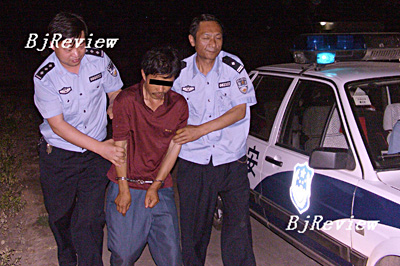
"I felt it was a fairly small thing," the fugitive said. "Just hitting and swearing at the workers and not giving them wages. The dead man had nothing to do with me." Foreman Heng Tinghan was speaking to police after being accused of holding workers in a kiln in Hongtong County in the northern province of Shanxi on June 17. One worker died and the police rescued 31 others, thin and scared.
Police investigations showed Heng, 42, a native of central Henan Province, lured 31 rural laborers from railway stations in Zhengzhou in Henan and Xi'an in Shaanxi as well as Yuncheng in Shanxi with promises to help them find jobs, and then forced or tricked them into grueling labor in kilns, mines and foundries across Shanxi and neighboring Henan.
The laborers were forced to work long hours with poor food. Dogs were hired to prevent them from escaping. Many received burns and other injuries working in the hot kiln. One person died in November 2006 and his death is being investigated.
Yang Aizhi, a 46-year-old mother, was one of the people who alerted the public to the scandal.
Her 16-year-old son went missing on March 8 this year and she had been searching for him since. On her travels she heard that her son might have been kidnapped and forced to work in a kiln in Shanxi.
Yang went to more than 100 kilns in Shanxi and discovered that "most kilns were forcing children to do hard labor," she was quoted as saying in the Southern Weekly. Some children were still wearing their school uniforms.
When the children were too tired to push carts, they were whipped by taskmasters, said Yang.
By June 18, five chief suspects, including kiln boss Wang Bingbing, foreman Heng Tinghan and hatchet men Zhao Yanbing, Heng Mingyang and Liu Dongsheng had all been arrested and confessed to charges, local police said.
Wang Dongyi, father of the kiln boss, has been sacked as party chief of Caosheng Village, where the kiln was located. Police are searching for three other suspects.
President Hu Jintao and Premier Wen Jiabao have issued instructions on the scandal. This is not the first time brutality in Shanxi's brick industry has stirred their concern. In 2003, Wen called for tough punishments after a teenage boy was forced into working in a kiln in Yongji.
"We are investigating whether other officials were involved," said Zhang Mingqi, Secretary of the All China Federation of Trade Unions, at a press conference on June 18 in Beijing.
A work team consisting of officials from the Ministry of Public Security, the Ministry of Labor and Social Security and the All China Federation of Trade Unions has been sent to Shanxi to investigate the case.
Sun Baosu, Vice Minister of Labor and Social Security and Head of the work team, said the case "had an extremely negative impact," and pledged to find out the truth, rescue all the victims and punish the perpetrators.
The local government has settled wages for workers, paid compensation for victims and sent apology letters to the workers, said Zhang.
"We are in touch with the family of the dead worker," said Zhang, adding that 23 of the 31 victims have been contacted and that police are still searching for the other eight.
Chinese police have detained 168 people accused of holding workers in slavery under appalling conditions at small brick kilns and mines in Shanxi and Henan.
For the present Shanxi is launching a comprehensive checkup on illegal labor treatment within the province and set out to uproot the illegal employment of teenage laborers.
The construction of grassroots labor unions, and the awareness promotion of labor laws and protecting one's own legal rights have much to be desired, confessed Zhang.
"The Caosheng Village for instance has not a single labor union," said Zhang, adding that labor unions in rural areas are still in their infancy and so migrant workers in the countryside rarely have support to turn to. | 